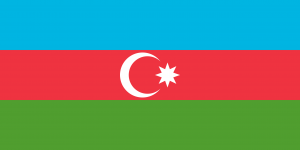Language/North-azerbaijani/Grammar/Nouns
| ◀️ Telling Time — Previous Lesson | Next Lesson — Pronouns ▶️ |
Hi North Azerbaijani learners! 😊
In this lesson, we will be discussing the basics of North Azerbaijani nouns. Nouns are an essential part of any language, and learning them is crucial for proficiency. By the end of this lesson, you will have a good understanding of North Azerbaijani nouns and their various forms. Let's get started!
Don't miss the chance to check out these pages as you wrap up this lesson: Future Tense, 0 to A1 Course, Give your Opinion & North Azerbaijani Alphabet.
What are Nouns?
Nouns are words that represent people, places, things, or ideas. They are one of the fundamental building blocks of a sentence and often act as the subject or object of a verb. In North Azerbaijani, nouns can be modified by adjectives or other nouns to provide more detail or context.
Types of Nouns
There are many different types of nouns in North Azerbaijani, but some of the common types include:
Common Nouns
Common nouns refer to general objects, people, or concepts. They are not specific to any individual or unique item.
| North Azerbaijani | Pronunciation | English |
|---|---|---|
| Dale | DA-le | House |
| Kitab | KI-tap | Book |
Proper Nouns
Proper nouns are capitalized and refer to specific individuals, places, or things.
| North Azerbaijani | Pronunciation | English |
|---|---|---|
| Maya | MA-ya | Maya (name) |
| Azərbaycan | A-zer-bay-JAHN | Azerbaijan |
Collective Nouns
Collective nouns refer to groups of people or things.
| North Azerbaijani | Pronunciation | English |
|---|---|---|
| Tamaşaçılar | ta-ma-sha-CHI-lar | Audience |
| Qrup | QRUP | Group |
Abstract Nouns
Abstract nouns refer to concepts, ideas, or emotions.
| North Azerbaijani | Pronunciation | English |
|---|---|---|
| Mənəviyyat | me-ne-vee-YAH-t | Spirituality |
| Sevinc | SE-vinch | Joy |
Gender and Number
In North Azerbaijani, nouns have gender, specifically masculine and feminine. This is important when it comes to modifying a noun with an adjective or pronoun. Additionally, nouns can be singular or plural, with different rules for forming the plural based on the gender of the noun.
Gender
In North Azerbaijani, gender is distinguished between masculine and feminine forms of the noun.
For example:
| North Azerbaijani | Pronunciation | English |
|---|---|---|
| Adam | A-dam | Man |
| Qadın | KHA-din | Woman |
Note that not all nouns are specifically masculine or feminine, and some nouns are the same in both forms:
| North Azerbaijani | Pronunciation | English |
|---|---|---|
| Gün | GUN | Day |
| Şəhər | SHE-her | City |
Additionally, there is no neuter gender in North Azerbaijani.
Number
Nouns in North Azerbaijani can be singular or plural. The plural form is typically formed by adding a suffix to the end of the word, although there are some irregular plurals.
For example:
| North Azerbaijani | Pronunciation | English |
|---|---|---|
| Kitab | KI-tap | Book |
| Kitablar | KI-ta-plar | Books |
Note that the plural form of the noun affects the form of the adjectives modifying it. For example:
| North Azerbaijani | Pronunciation | English |
|---|---|---|
| Uzun kitab | Oo-ZOON KI-tap | Long book |
| Uzun kitablar | Oo-ZOON KI-ta-plar | Long books |
Cases
North Azerbaijani nouns inflect to reflect their grammatical case. There are six cases, each indicating a different relationship between the noun and other elements of the sentence.
Nominative Case
The nominative case is used for the subject of a sentence.
For example:
- Mən bir mühəndisəm. (I am an engineer.)
Accusative Case
The accusative case is used for direct objects.
For example:
- Mən kitab oxuyuram. (I am reading a book.)
Genitive Case
The genitive case is used to indicate possession.
For example:
- Azərbaycanın bayrağı. (The flag of Azerbaijan.)
Dative Case
The dative case is used for indirect objects.
For example:
- Mənə pul verin. (Give me money.)
Locative Case
The locative case is used to indicate location.
For example:
- Məktəbə gedirəm. (I am going to school.)
Ablative Case
The ablative case is used to indicate motion away from something.
For example:
- İş yerindən çıxıram. (I am leaving the workplace.)
Dialogue
Let's see some of the nouns we have learned in the context of a dialogue.
- Person 1: Salam, nə vaxtsan? (Hi, what time is it?)
- Person 2: Sekizdəqiqə qalıb. (It's eight minutes left.)
- Person 1: Uşaqlar hər gün məktəbə gedirlər? (Do children go to school every day?)
- Person 2: Bəli, hər gün gedirlər. (Yes, they go every day.)
Conclusion
In this lesson, we discussed the basics of North Azerbaijani nouns, including the different types, genders, numbers, and cases. Like any part of a language, it takes time and practice to master these concepts. To improve your understanding of North Azerbaijani nouns, you can also use the Polyglot Club website. Find native speakers and ask them any questions! Good luck with your studies.
Sources
Finished this lesson? Check out these related lessons: Pronouns, North Azerbaijani Culture – Traditions and Celebrations, Past tense verbs & How to Use Be.
Other Lessons
- Questions
- Pronouns
- Future Tense
- How to Use Have
- Adjectives
- Give your Opinion
- Negation
- Conditional Mood
- How to Use Be
Template:North-azerbaijani-Page-Bottom
| ◀️ Telling Time — Previous Lesson | Next Lesson — Pronouns ▶️ |

